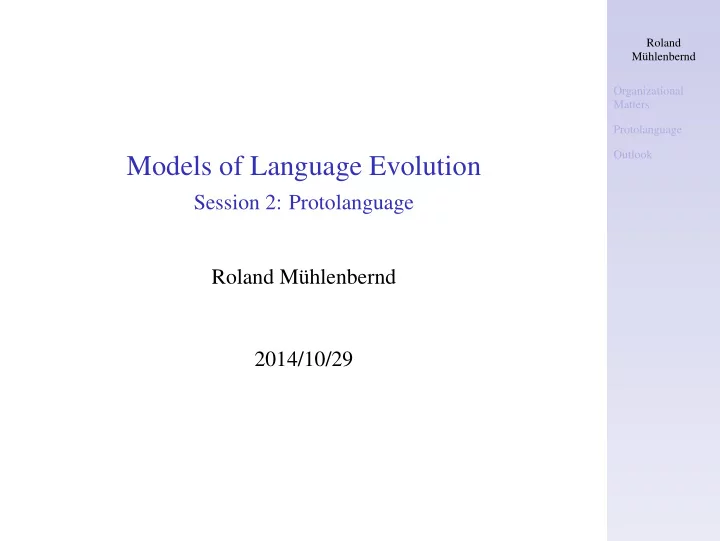

Roland Mühlenbernd Organizational Matters Protolanguage Outlook Models of Language Evolution Session 2: Protolanguage Roland Mühlenbernd 2014/10/29
Organizational Matters Roland Mühlenbernd ◮ literature and homework on moodle Organizational ◮ Hauptseminarschein: 80 % of maximal homework score Matters plus graded work: Protolanguage ◮ presentation about latest research Outlook ◮ mini project: modeling and implementation (1-3 students) ◮ 1 student: modeling with short informal presentation ◮ 2 students: modeling + full presentation ◮ 3 students: modeling + full presentation + short article ◮ Note: SG (student’s grade) is determined by IG (individual grade in the project) and PG (project grade) ◮ SG = 2 × IG + PG 3 ◮ attendance required!! (one unexplained absence) ◮ please introduce yourself: ◮ name, bachelor/master student in X ◮ I am interested in the seminar, because... ◮ I plan a graded work as... about...
Organizational Matters Roland Mühlenbernd ◮ 22.10 Language Evolution - Overview Organizational Matters ◮ 29.10 Language Evolution - Protolanguage Protolanguage ◮ 12.11 Models of Language Evolution Outlook ◮ 19.11 Evolutionary Game Theory ◮ 26.11 The Iterated Learning Model ◮ 03.12 Further Models ◮ 10.12 Students’ Presentations ◮ 17.12 Students’ Presentations ◮ 07.01 Students’ Presentations ◮ 14.01 Students’ Presentations ◮ 21.01 Students’ Presentations ◮ 28.01 Students’ Presentations ◮ 04.02 Recent Work ◮ 11.02 Recent Work
Including and Excluding Issues Roland Mühlenbernd Organizational Including Issues Matters Protolanguage 1. How did symbolic units evolve? Outlook 2. How did syntax evolve? 3. What was the initial selective pressure? 4. Was the development gradual or abrupt? 5. How did the development of phonology relate to 1) & 2)? 6. Did language begin with speech or sign? Excluding Issues ◮ How did/do languages change/interact? (cultural evolution) ◮ Did language begin in one place or several?
Bickerton’s Concept of Protolanguage Roland Mühlenbernd Organizational Matters Protolanguage Protolanguage ◮ is starting point of gradual process (instead of abrupt / Outlook sudden steps) to fully developed modern language ◮ entails common nouns and verbs ◮ entails synthetic items that can be combined VS holophrastic strings that get segmented ◮ has a limited vocabulary of simple items (words), but no consistent structural properties ◮ does not have a sophisticated phonology ◮ involves a longish period between the emergence of symbolic units and the emergence of syntax
Punctuated Evolution of Human Language Roland Mühlenbernd Organizational Matters According to the theory of “punctuated equilibrium”, Protolanguage most evolutionary change does not occur Outlook continuously within a lineage, but is confined to burst of change that are relatively brief on the geological time scale, generally corresponding to speciation events, followed by long periods of stasis. Pinker and Bloom (1990) Note: ◮ Assuming that language evolution followed a progress that includes “punctuated equilibria”, then we must expect different stages of communicative behavior / language use.
Jackendoff’s Stages Roland Mühlenbernd Organizational Matters Protolanguage Outlook Source: Jackendoff, R.(1999), Possible Stages in the Evolution of Language Capacity, Trends in Cognitive Sciences 3.7, pp 272-279.
What is Protolanguage? Roland Mühlenbernd Organizational Matters Protolanguage Outlook Jackendoff (1999) ◮ modern language minus syntax ◮ a still available feature in modern language ◮ ergo: look for ‘traces’ and ‘fossils’ in modern language
Jackendoff’s Fossils Roland Mühlenbernd Organizational Name similarities and differences of the following words of Matters human language: Protolanguage Outlook “hello” “shh” “yes!” “ouch”
Jackendoff’s Stages Roland Mühlenbernd Organizational Matters Protolanguage Outlook Source: Jackendoff, R.(1999), Possible Stages in the Evolution of Language Capacity, Trends in Cognitive Sciences 3.7, pp 272-279.
Kirby’s Questions Roland Mühlenbernd Organizational Matters Protolanguage Kirby (2007) Outlook ◮ Structure : Why is language the way it is and not some other way? How can an evolutionary approach explain the particular language universals we observe? ◮ Uniqueness : Why are we unique in possessing language? What is so special about humans? ◮ Function : How could language evolve? What were the selective pressures involved? ◮ History : What is the evolutionary story for language? When did it evolve? Were there intermediate stages?
Structure/Uniqueness of Human Language Roland Mühlenbernd Organizational Matters Protolanguage Outlook (a) Jack built the house that the malt that the rat that the cat killed ate lay in. (b) The cat killed the rat that ate the malt that lay in the house that Jack built.
Uniqueness: Comparative Approach Roland Mühlenbernd Organizational Matters Protolanguage Outlook ◮ Compare features of human language and human language faculty with communication systems of other species ◮ Hauser, Chomsky & Fitch (2002): ◮ FLB : faculty of language in the broad sense = all aspects of language faculty ◮ FLN : faculty of language in the narrow sense = human-specific core computational system that e.g. enables to parse the following sentences in (a) and (b) ◮ FLN is limited to a mechanism implementing recursion
Protolanguage Roland Mühlenbernd Organizational Matters Protolanguage Kirby mentions Bickerton’s propose to look for living fossils of Outlook protolanguage, which can be found in three types of linguistic behavior: 1. Pidgin communication 2. Child language 3. Language of trained apes All forms of linguistic behavior have some minimal structure: simple sentences whose meaning is composed of the words’ meanings.
Kirby’s Iterated Learning Roland Mühlenbernd Organizational Matters Non-trivial interaction of three dynamical systems: Protolanguage Outlook From: Simon Kirby (2007) ”The Evolution of Language”
Timescale of Literature Roland Mühlenbernd 1990 Pinker & Bloom: language evolution theory Organizational 1991 Matters 1992 Protolanguage 1993 Outlook 1994 1995 Bickerton: PL-fossils in form of language behavior 1996 1997 1998 1999 Jackendoff: PL-fossils in instances of Human language 2000 2001 Simulating the Evolution of Language ← ← ← ← ← ← 2002 Hauser, Chomsky & Fitch: FLN = FLB + recursion 2003 2004 2005 2006 2007 Bickerton: perspective from linguistics Kirby: perspective from LE-modelers
Recommend
More recommend